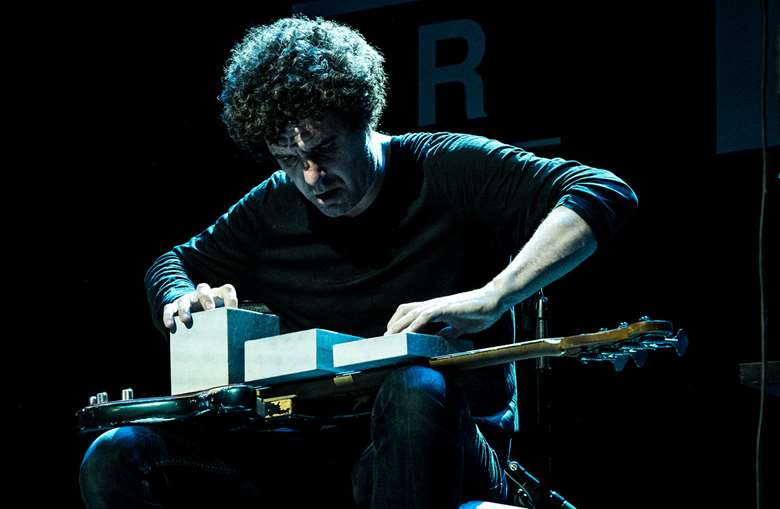Composition smears into improvisation at The Jazzdor-Berlin intersection of France, Germany and the USA
Martin Longley
Tuesday, July 18, 2023
Martin Longley witnesses new works featuring Nguyên Lê, Jon Irabagon, Louis Sclavis and Mike Ladd…

The French Jazzdor festival in Strasbourg has hit 38 editions now, but also continues with this 15th Berlin outpost four-dayer, matching players from both countries. This year Jazzdor also invited a clutch of Americans to collaborate with the French and German line-ups. The aura in ‘23 hung more around free improvisation than in ‘22, although there were still an abundance of conceptually composed premieres. Artists are usually asked to unveil new works, and these are often German or even global debuts. All of the sets are in the Kesselhaus, a voluminous converted brewery-space, with two or three acts performing each night.
Clément Janinet (violin/mandolin) leads Ornette Under The Repetitive Skies, a band who played at Jazzdor’s Budapest takeover in March, but this Berlin performance didn’t reach the same heights. The rest of the line-up includes tenor saxophone, bass and a drummer who doubles on vibraphone (Emmanuel Scarpa). The band plays with varying degrees of friction, shaping a grainy stasis, striving for a slow gathering of passionate forces. A sudden creeping development is all-consuming, as a tenor solo leads a heightening of expression, speed and strength. They also pay homage to Alice Coltrane, over an Indian-style drone, a slow riff quality led by the electric mandolin, before Janinet switches for an abrasive violin solo. Still very fine, even if it didn’t match the Budapest gig!
Saxophonist Christophe Monniot also had a few familiar players in his band, joined by guitarist Nguyên Lê, keyboardist Josef Dumoulin, and bassist Bruno Chevillon. Only the trumpeter Aymeric Avice and drummer Franck Vaillant were new names. Dumoulin opened on acoustic piano and Chevillon’s upright sounded like an electric. Together they initiate a rolling groove, and with the horns out front with their tough themes, it’s almost bordering on straight bebop, excitingly. Lê steps forward in trio frame, his knob-twiddling paramount, turning to fusion, energised from the Brecker Brothers right through to free wildness. This crew command many moods, including Dumoulan’s cosmic synthscapes, Lê reining in to a quiet tinniness, and Monniot proving to be a dynamic leader and prompter. Oddly, their next dedication is to Leonard Bernstein, but Lê’s next searing solo hasn’t got much to do with that composer’s music.
Electric bassist Olivier Lété led a trio with drummer Toma Gouband and a returning Avice, with much environmental sculpting, the trumpet often dominant as the other pair set up a steady foundation. Gouband lays metal objects across his skins, for speedy tinkering, a cloth on his drums for muted tumbling. Lété uses three cardboard boxes on his strings, coaxing out resonances, and Gouband plays lightly with fistfuls of herbs, then dried twigs, trumpet now muted. Next, the pine cones come out from this organic percussion master’s bag. Lété draws a string down to the floor, bowing it mournfully. This trio is loaded with surprise.
Saxophonist Sylvain Rifflet is the master of producing vari-styled conceptual programmes, but his Rebellion[s] is overloaded with spoken texts, of a wildly incongruous nature, mashing up countries, languages, issues and eras in an unconvincing chaos of grasping at protest without focus. With the exceptional saxophonist Jon Irabagon in the band, we were crying out for more music, for more of his dangerously serpentine solos. Conceptual mass disturbed continuity. We had to grasp the limited instrumental outbreaks with fleeting relish.
 Richard Bonnet & Mike Ladd - Photo by Ulla C. Binder
Richard Bonnet & Mike Ladd - Photo by Ulla C. Binder
Rapper/wordsmith Mike Ladd joined a collective quintet that seemed dominated by guitarist Richard Bonnet, but also featured Tom Rainey (drums), plus Chevillon again. Ladd’s lines were well judged in mood and execution, as well as subject matter, illustrating how well a text-based set can work out. Ladd has a confident casualness to his delivery, a natural flow, supported by some stinging Bonnet guitar licks, the players boasting a dynamic relationship. We could name this music math-jazz-hop.
The Musina Ebobissé 5tet were probably unknown to most folks in the audience, a young crew fronted by the saxophonists Olga Amelchenko and the leader himself. They spread out cool vibrations, quite mainline in character, very harmonious but lacking in action. The most unusual patch was when the reeds stood aside and the remaining piano trio took over.
Louis Sclavis (bass clarinet), Vincent Courtois (cello) and Aki Takase (piano) formed a veteran trio, their combined stomping feet making up for the lack of a drummer.
There was a chamber orientation at first, but the third number set off on a jazz chase, suggesting a good deal of composition present in this set. Sclavis issued a robust reed solo, squealing and smearing into a manic overdrive. Suddenly, Takase quoted “Merry Christmas Mr. Lawrence”, paying homage to Ryuichi Sakomoto.
Compared to the previous year, Jazzdor-Berlin was much better attended, not only with all of its seats filled every night, but with the audience spilling out in a standing group to the rear of the Kesselhaus.